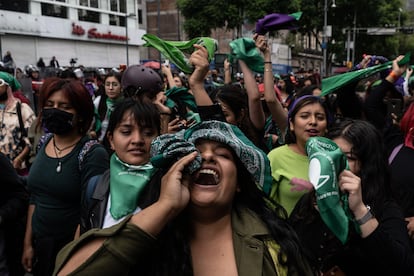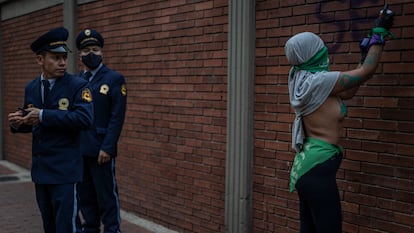Winning the right to abortion: the revolution of Latin American women
When Roe v. Wade was repealed in the United States, decades of progress in the struggle for reproductive rights were threatened. But across the Western Hemisphere, the tide has recently been in favor of the right to choose, with the decriminalization of abortion in Argentina, Colombia, and Mexico


Simone de Beauvoir once said: “Never forget that a political, economic or religious crisis will be enough for women’s rights to be questioned again. These rights are never to be taken for granted; you must remain vigilant throughout your life.” It was an omen. Such a situation occurred in June 2022, when the United States Supreme Court repealed the right to abortion in the country, 50 years after it was encoded into law. The repeal of Roe v. Wade proved that changes in political or judicial power could put past victories into jeopardy. It dealt a blow to the decades of struggle; however, it failed to stem the tide throughout the Western Hemisphere. In Argentina, Colombia, and Mexico, the justice systems have recently decriminalized the interruption of a pregnancy at the federal level. These rulings have emerged as beacons of hope in the defense of women’s reproductive rights in the Americas.
Behind the latest Latin American victory (Mexico), there was no luck — only an ambitious legal strategy that has been in the works for years. “It’s now or never,” thought the lawyers belonging to GIRE (Grupo de Información en Reproducción Elegid), just before they began to file dozens of cases, in an attempt to modify the criminal codes in the majority of Mexico’s 32 states. The plan began after September 7, 2021. That day, the Supreme Court of Justice of the Nation (SCJN) ruled that it was unconstitutional to put a woman in jail for having an abortion. Then-president of the court Arturo Zaldívar called the ruling “a new route towards freedom, dignity, and respect and a great step in the historic fight for equality.”
The precedent was so strong that GIRE — a feminist organization — decided to take advantage of it, to change the future of millions of women. The first step had been achieved: women could no longer be imprisoned for getting abortions. Judges had the obligation to dismiss their cases, but women could still be criminalized, persecuted and stigmatized in other ways. The ideal path would have been for the local state legislatures to voluntarily decide to change their legislation. However, two years after the ruling, only 11 states had eliminated the crime of abortion. And, even in those states, access to abortion was very limited. For example, in the state of Sinaloa, if women arrived at a state medical center to terminate their pregnancy, but were users of federal health services or social security programs, they were sent to facilities run by said institutions, where abortion was still prohibited.
This is how the calculations and variables began. In which states were there going to be the most obstacles? And which states should be tackled first? Based on these questions, the lawyers from GIRE prepared their strategy. And, this past week, the results could finally be seen. The first victory was winning protection for abortion rights in Aguascalientes — one of the most conservative states in the country. Then, the Supreme Court unanimously determined that the articles that regulated abortion in the federal criminal code should be repealed and that federal health institutions were obliged to care for women who wanted to terminate their pregnancies, without medical personnel being criminalized. Until just a few days ago, they could have faced five years of suspension from practice for providing abortion services.
After this ruling, Rebeca Ramos — the director of GIRE –—recalls that her phone began to overflow with messages. She was being congratulated after 20 years of legal battles. “What follows now is that abortion in the remaining 21 states be decriminalized, through protections,” she explains to EL PAÍS. “The most important thing is the provision of services and conditions: if a woman decides to have an abortion, they can do it safely at home, [or if a woman] needs to go to a hospital, they’ll take good care of her there. This must happen throughout the country.” She quickly clarifies: “This isn’t a simple task.”
The latest achievements in Mexico have gone hand-in-hand with the judiciary. “It’s a bittersweet feeling,” Ramos reflects. “On the one hand, it’s sad to see that the state congresses made reforms to hinder rights, when you’d expect that your representatives and the secular state would offer protections. But, at the same time, I’m very satisfied that there are different powers and counterweights. My little lawyer heart says, ‘How nice that the law has been used as a tool to promote rights,’” she laughs.
The court has also been a great ally in Colombia, where, last year — in a pioneering international ruling — abortion was decriminalized during the first 24 weeks of pregnancy. This happened on February 21. By the 22nd, the organization that had promoted the norm had a new job: to protect it. “When the ruling came out, the anti-rights groups filed more than 30 requests for annulment,” explains Dr. Ana Cristina González, from the NGO Causa Justa. “Even now, after the ruling of the Constitutional Court has been reaffirmed, we cannot let our guard down.”
The right to abortion has become a fight of attrition. Feminist organizations push to achieve progress and, when they achieve it, they have to close ranks to defend it. “We already had a judicial decision from 2006 that had created three legal grounds [for allowing abortion], but we had to fight to protect that decision for 15 years,” Dr. González notes. She recalls that, even after the courts ruled in their favor, conservative groups promoted a citizens’ referendum, to reject the right to terminate a pregnancy.

But the expert in bioethics is optimistic: “Opinion surveys from 2017 to date have shown that public opinion is increasingly in favor of this being a decision for women. 92% of people are against forced motherhood, and no more than 2% of people want the Church and the state to get involved in these personal decisions.” Therein lies the movement’s success, according to the pioneer from Causa Justa: “[We’ve won] by changing people’s hearts and minds: that is, advancing social decriminalization.”
Despite the shadow of the repeal of Roe v. Wade, Ana Cristina González believes that “the last four decades have been about the consolidation of rights.” “We’re in a movement that’s moving forward — all such movements generate resistance. There are structures that are still very rigid within our society, which resist the advancement of women’s rights, because they challenge the state at all levels. And we’re demanding what I consider to be the cultural battle of this century: the reproductive freedom of women, to decide what we do with our bodies.”
In Latin America, there are still countries where a woman cannot have an abortion even if she has been raped, her life is in danger, or the fetus has malformations. There is a total ban in place in Honduras, Nicaragua, El Salvador, the Dominican Republic, Haiti, Suriname, and Jamaica. In Panama, women have to go through a multidisciplinary commission to be granted an abortion. In Guatemala, Peru, Costa Rica and Venezuela, an abortion can only be performed if there is a clear risk to the life of the pregnant woman. There is no country in the region that fully recognizes the will of women as recommended by the World Health Organization (WHO). Even in Argentina — a country that legalized abortion in the first 14 weeks of a pregnancy in 2020 — attacks against women’s rights have been virulent.
Javier Milei won the Argentine presidential primaries in August. And, a few days later, after announcing a multitude of proposals against science, against the repudiation of the last Argentine military dictatorship (1976-1983) and against state protections, he also had one for women: calling for a plebiscite to repeal abortion.
“I think that just the threat is an attempt to try to tame us,” says Argentine activist Luciana Peker, who doesn’t believe that this battle will be easy for the far-right. “The political process in Argentina — to legalize abortion through Congress — was very profound. It touched the entire democratic structure, it put a million people on the streets. It was a process that got to the core of democracy,” the journalist explains.
“Now comes this sexist response, because, evidently, the right to abortion is the greatest achievement of women, and it bothers the extreme-right of Trump, Bolsonaro, Vox [in Spain] and Milei. It’s a right that represents the possibility of the future, of progress. In a collapsed world, it’s the political symbol that shows how we’re better off now than before, and that we can still be better. That bothers them a lot,” Peker affirms.
The Argentine journalist and activist concludes: “The right to abortion is the most important political construction that has been made in Latin America. It’s the only unified policy that exists in the entire region. And we women have made it so.”

Sign up for our weekly newsletter to get more English-language news coverage from EL PAÍS USA Edition
Tu suscripción se está usando en otro dispositivo
¿Quieres añadir otro usuario a tu suscripción?
Si continúas leyendo en este dispositivo, no se podrá leer en el otro.
FlechaTu suscripción se está usando en otro dispositivo y solo puedes acceder a EL PAÍS desde un dispositivo a la vez.
Si quieres compartir tu cuenta, cambia tu suscripción a la modalidad Premium, así podrás añadir otro usuario. Cada uno accederá con su propia cuenta de email, lo que os permitirá personalizar vuestra experiencia en EL PAÍS.
¿Tienes una suscripción de empresa? Accede aquí para contratar más cuentas.
En el caso de no saber quién está usando tu cuenta, te recomendamos cambiar tu contraseña aquí.
Si decides continuar compartiendo tu cuenta, este mensaje se mostrará en tu dispositivo y en el de la otra persona que está usando tu cuenta de forma indefinida, afectando a tu experiencia de lectura. Puedes consultar aquí los términos y condiciones de la suscripción digital.








































